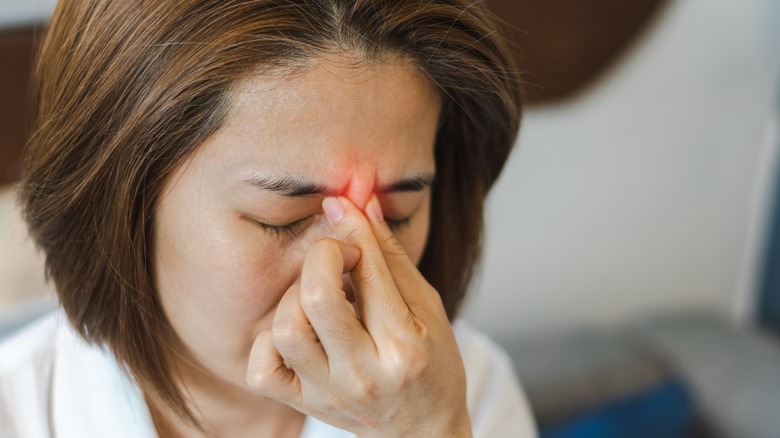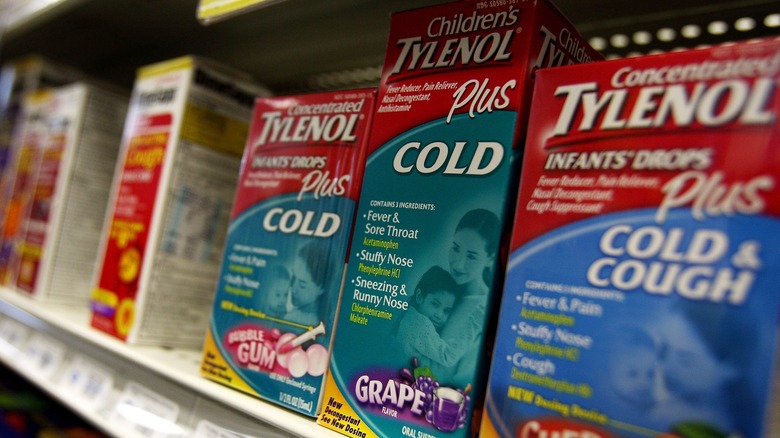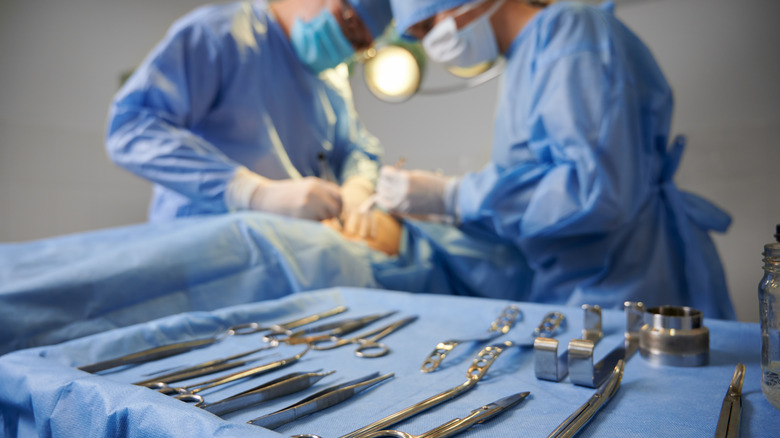Sinus Headache Explained: Causes, Symptoms, And Treatments
Nothing can ruin your day like a sinus headache — that achy, heavy pain behind your nose, cheeks, and forehead, caused by the pressure of excessive mucus buildup in your sinuses, the series of interconnected spaces behind the middle and top of your face (per the Cleveland Clinic). Even worse, some people have found sinus headaches (and sinus problems in general) frustratingly persistent and difficult to treat, per Mass Eye and Ear.
A big reason for this, according to the Mayo Clinic, is that the term "sinus headache" is a blanket term for a cluster of symptoms, not a single condition. And as Mass Eye and Ear notes, these symptoms can have a number of different root causes. This means that not all treatments work for all sinus headaches, so freeing yourself from frequent sinus headaches will require a bit of detective work to determine exactly what's causing your headaches. Fortunately, there are proven treatments for the different types of sinus pain — so with some work and medical support, you can take control of your sinus headaches once and for all.
Your sinus headache could actually be a migraine
According to the Mayo Clinic, there's a good chance your sinus headache may be more than just a case of stuffy sinuses: About 90% of perceived cases of sinus headaches are, in fact, migraines. Penn Medicine classifies a migraine as a neurological condition, and a headache is just one of its symptoms. Like true sinus headaches, migraine-related headaches can result in pain behind the face as well as nasal congestion, making them easy to confuse, according to Orlando Health.
However, there are ways to tell a sinus headache and a migraine apart. According to the Orlando Health, if your headache is accompanied by a clear nasal discharge, it's a migraine. If you have a true sinus headache caused by a sinus infection, any nasal discharge will be thick and discolored. In addition, according to the Mayo Clinic, if your headache was triggered by noise or light or was accompanied by nausea and/or vomiting, it's almost certainly a migraine.
A sinus headache looks and feels like this
Sinus headaches have a number of telltale features, according to Mount Sinai. First, your face may feel tender, or your headache pain may be localized to just a small area of your face, such as behind your eyes. Second, your pain may be more severe in the morning, since mucus has been collecting in your sinuses overnight, resulting in extra pressure against your sinuses. Moving your head sharply or leaning forward can also trigger additional pain, as can moving quickly from one temperature to another, such as leaving a heated house on a cold day. In addition, while migraine headaches last a few hours or days (per the Mayo Clinic), headaches caused by sinus infections tend to last longer.
Because true sinus headaches are caused by sinus infections, they can be triggered by respiratory conditions such as a cold, flu, or allergies, and may be accompanied by symptoms typical of other respiratory infections, such as a sore throat, nasal congestion, a fever, and fatigue (per the Orlando Health). So if you catch a bug and your head starts throbbing a few days later, chances are it's a sinus headache.
These factors may put you at risk of a sinus headache
Not all people experience sinus headaches, and some people get sinus headaches more than others. And if you're one of the unlucky ones who experience them frequently, chances are you also have one of a number of health conditions known to increase your risk of sinus headaches.
Because sinus headaches are triggered by excess mucus failing to drain from the sinuses, allergies (especially hay fever) and asthma — which can cause the nasal and sinus passages to became inflamed and impede drainage, according to the American College of Allergy, Asthma, & Immunology – can raise your risk of a sinus headache (via Mount Sinai). A weak immune system, which will make you more vulnerable to infections in general, will also raise your sinus headache risk. And structural abnormalities that impede draining from the sinuses, such as nasal polyps, nasal bone spurs, a deviated septum, or a cleft palate, can also raise your risk.
You can take action to prevent sinus headaches
Sinus headaches resulting from sinus infections may be frustrating and painful, but there are proven strategies you can use to reduce your chances of getting one. Many of these involve keeping your nasal passages moist to prevent inflammation that can lead to blocked sinuses and headaches. Harvard Health Publishing recommends daily nasal irrigation with a solution of boiled and cooled distilled water, non-iodized salt, and baking soda; inhaling steam; and avoiding dry environments.
In addition, you should drink plenty of water (this facilitates the production of thinner, better-draining mucus) and sleep with your head elevated to facilitate faster drainage of the sinuses. And while over-the-counter medications can be helpful, don't overdo it: For instance, while nasal sprays can shrink membranes and increase drainage, overdependence on them can lead to a rebound effect in which the membranes become swollen when the medication wears off — making your congestion even worse.
Use these medications to relieve a sinus headache at home
A number of over-the-counter medications have been found helpful for relieving sinus headaches — and according to Mount Sinai, most of these are the same medications you may already use for colds and allergies. Common nasal and oral decongestants such as Afrin, Neo-Synephrine, Sudafed, and Actifed can help relieve clogged sinuses and nasal passages. If your sinus headaches were triggered by allergies, antihistamines can help relieve allergy symptoms such swollen nasal passages and itching, according to Medline Plus. Common brands, according to Mount Sinai, are Benadryl, Claritin, Allegra, and Zyrtec.
While these medications can bring relief, use caution and take your other health factors into account when using them. For instance, medications containing pseudoephedrine, such as Sudafed, can raise your blood pressure, so should not be taken by those with high blood pressure or an enlarged prostrate. And while antihistamines can relieve the allergy symptoms that trigger some sinus headaches, according to Harvard Health Publishing, they also thicken mucus, making it harder to drain from the sinuses. So if you have questions about whether an over-the-counter medication is safe or appropriate for you, talk to your doctor.
Non-medical treatments can also soothe sinus headaches
If you find yourself with a sinus headache and want to forgo the drugs — or find a safe way to get additional relief — there are a number of easy non-medical techniques you can try. For instance, Downriver ENT recommends applying a warm compress to the areas on your face where you feel pain and using a saline nasal spray to thin and loosen mucus for better drainage. Inhaling steam from a vaporizer or pot of just-boiled water can also help ease sinus congestion.
Some sinus headache sufferers have found relief from stretches involving the head and neck, or relaxation techniques such as yoga, biofeedback, or meditation, according to Mount Sinai. Pristyn Care notes that yoga eases sinus pain by reducing pressure to various points in the sinuses, and according to Harvard Health Publishing, relaxation techniques promote other healthy living habits — such as getting adequate sleep — that facilitate healing. In addition, Mount Sinai notes that acupuncture and chiropractic are also used by some for sinus headache relief, though little research has been done to show their effectiveness.
Some common foods can trigger sinus headaches
To get some relief from your sinus headaches, you might want to take a closer look at your daily menu: According to the NY Center for Sinus Relief, a number of everyday foods can trigger sinus headaches in some people. These foods include alcoholic and caffeinated drinks, processed meats containing nitrates (such as salami), chocolate, wheat, dairy, artificial sweeteners, eggs, fish, and strawberries. These trigger foods either contain tyramine (which can trigger headaches in some people) or histamines (which cause inflammation of the nasal membranes that can contribute to sinus headaches, per Medline Plus), or cause the body to produce histamines.
Different people will have different reactions to these foods, so not all of these, if any at all, may have any effect on your headaches. But if you suspect your diet may be contributing to your headaches, the NY Center for Sinus Relief recommends keeping a food diary to help you identify any foods that might be problematic for you.
Here's when you should seek medical help for sinus headaches
Sinus headaches are a major bummer, but fortunately, you can treat most of them at home. Over-the-counter medications can ease the worst of your symptoms (per Mount Sinai), as can non-medical strategies such as applying a warm compress to painful areas, according to the Cleveland Clinic. However, since sinus headaches are themselves a symptom of one or more other underlying conditions, which can include sinus infections, allergies, or physical deformities in the nasal cavity, severe or persistent sinus headaches could indicate a worsening of your underlying condition and require medical attention (per Cedars-Sinai).
So how can you know when it's time to call your doctor? If you have a fever or your headache lasts more than 10 days and over-the-counter medication doesn't seem to be helping, it's a sign of a more serious condition requiring medical help. Your doctor can conduct a physical examination and run tests to determine the root cause of your headaches and the best way to address it.
Prescription medications to treat persistent sinus headaches
If over-the-counter medications aren't enough to ease your sinus headaches, per Cedars-Sinai, your doctor may provide you with a prescription for more targeted medication. For instance, if your doctor determines your headaches are caused by a bacterial infection in your sinuses, he or she may prescribe an antibiotic. However, contrary to popular belief, not all serious sinus problems require antibiotics. According to Mass Eye and Ear, antibiotics won't help — and may trigger harmful side effects — if your sinus headaches are caused by allergies or a virus, rather than a bacterial infection. And even if you do have a bacterial infection, there's a chance you may still experience side effects — including severe allergic reactions and diarrhea — if you take antibiotics, per the Centers for Disease Control and Prevention. Thus, your doctor may advise caution when writing your antibiotic prescription and recommend you wait a few days to see if your condition improves before you fill your prescription.
If your sinus headaches are due to inflammation triggered by allergies, prescription allergy treatments such as allergy shots may offer some relief, according to Mass Eye and Ear. Other prescription options for sinus headache caused by allergies are corticosteroid pills and nasal sprays, according to Cedars-Sinai.
Surgical interventions to treat sinus headaches
In some cases, the root cause of your sinus headaches might be your anatomy — the pressure and blockage you're experiencing in your sinuses may be due to constriction in your sinuses and nasal passages that prevents proper drainage, per the Cleveland Clinic. For instance, a deviated septum –an abnormality in which the ridge of bone and cartilage along the length of your nose is displaced — can impede drainage and make breathing through the nose difficult, as can nasal polyps and other structural issues.
While many people with chronic sinus conditions caused by structural factors successfully manage their symptoms with medication, in some cases surgery is a needed to correct the problem. A range of surgical procedures can be used to treat sinus issues, according to Mass Eye and Ear, and the right one for you depends on the exact nature of your condition. Deviated septum surgery is a common procedure for sinus relief and involves repositioning the septum so it runs straight down the center of your nose. Another procedure reduces the size of swollen turbinates, structures in the nose that humidify inhaled air. Endoscopic surgery can also be used to widen the passages connecting the nasal tract to the sinuses to facilitate better drainage.
Ongoing sinus headache management
Even if you and your doctor decide surgery is the best option for addressing your sinus headaches, Mass Eye and Ear warns that it's not a magic bullet: While surgery has been proven to alleviate sinus symptoms and make daily living a lot more comfortable for some people, it won't stop you from ever getting another sinus headache again. This is because sinus headaches have a number of potential causes, so correcting structural issues alone can't stop sinus infections or allergies, which can also lead to sinus headaches — though surgery can make future headaches shorter and more bearable.
In short, you should think of your sinus surgery as just one of many tools at your disposal for sinus headache management, along with prescription and non-prescription medication, a healthful diet, and healthy lifestyle habits including getting sufficient sleep and controlling stress, according to the Cleveland Clinic. Continue to be proactive in addressing any sinus issues that crop up — and chances are, any sinus headaches you do get will pass more quickly than before.












